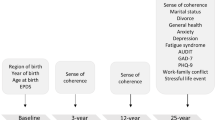Abstract
Antonovsky’s original observations of mental health among women who had survived Nazi concentration camps became the start for the formulation of sense of coherence (SOC) and suggested that the experience of negative life events can be a risk-factor for, whilst SOC can be a protection-factor against, mental ill-health. In the present study, 1,012 women responded to a questionnaire at two points in time that measured mental ill-health, SOC and the experience of negative life events. The results showed that women who had recently experienced negative life events had higher levels of mental ill-health compared to women who had not recently experienced any negative life events. SOC was also found to have a main effect on mental ill-health but neither moderated nor mediated the relation between negative life events and mental ill-health. Suggestions for future research and practical implications are given.
Similar content being viewed by others
References
Albertsen, K., Nielsen, M. L., & Borg, V. (2001). The Danish psychological work environment and symptoms of stress: The main, mediating, and moderating role of sense of coherence. Work and Stress, 15, 241–253.
Antonovsky, A. (1979). Health, stress and coping. San Francisco, CA: Jossey-Bass.
Antonovsky, A. (1987). Unraveling the mystery of health: How people manage stress and stay well. San Francisco, CA: Jossey-Bass.
Antonovsky, A. (1993). The structure and properties of the sense of coherence scale. Social Sciences and Medicine, 36, 725–733.
Bandura, A. (1977). Self-efficacy: Toward a unifying theory of behavioral change. Psychological Review, 84, 191–215.
Bergsten-Brucefors, A., Hochwälder, J., Jeanneau, M., & Fosselius, H. (2004). Psykisk hälsa hos icke-sjukskrivna kvinnliga sjuksköterskor och undersköterskor [Mental health among female registered and assistant nurses that are not on sick-leave]. Rapport 2004:1. Samhällsmedicin: Stockholms läns landsting.
Biró, É., Balajti, I., Ádány, R., & Kósa, K. (2010). Determinants of mental well-being in medical students. Social Psychiatry and Epidemiology, 45, 253–258.
Bishop, G. D. (1993). The sense of coherence as a resource in dealing with stress. Psychologia, 36, 259–265.
Carmel, S., Anson, O., Levenson, A., Bonneh, D. Y., & Maoz, B. (1991). Life events, sense of coherence and health: Gender differences on the kibbutz. Social Sciences and Medicine, 32, 1089–1096.
Cohen, J., Cohen, P., West, S. G., & Aiken, L. S. (2003). Applied multiple regression/correlation analysis for the behavioural sciences (3rd ed.). Hillsdale, NJ: Erlbaum.
Cohen, S., Gottlieb, B. H., & Underwood, L. G. (2000). Social relationships and health. In S. Cohen, L. G. Underwood, & B. H. Gottlieb (Eds.), Social support: Measurement and intervention. A guide for health and social scientists (pp. 3–25). New York: Oxford University Press.
Eriksson, M., & Lindström, B. (2008). Validity of Antonovsky’s sense of coherence scale: A systematic review. Journal of Epidemiology and Community Health, 59, 460–466.
Finlay-Jones, R., & Brown, G. W. (1981). Types of stressful life event and the onset of anxiety and depressive disorders. Psychological Medicine, 11, 803–815.
Flannery, R. B., & Flannery, G. J. (1990). Sense of coherence, life stress, and psychological distress: A prospective methodological inquiry. Journal of Clinical Psychology, 46, 415–420.
Goldberg, D. P., & Hillier, V. F. (1979). A scaled version of the General Health Questionnaire. Psychological Medicine, 9, 139–145.
Goldberg, D., & Williams, P. (1991). A user’s guide to the General Health Questionnaire. Windsor: The NFER-NELSON Publishing Company Ltd.
Hochwälder, J., & Forsell, Y. (2011). Is sense of coherence lowered by negative life events? Journal of Happiness Studies, 12, 475–492.
Isaksson, K., Johansson, G., Bellaagh, K., & Sjöberg, A. (2004). Work values among the unemployed: Changes over time and some gender differences. Scandinavian Journal of Psychology, 45, 207–214.
Jorgensen, R. S., Frankowski, J. J., & Carey, M. P. (1999). Sense of coherence, negative life events and appraisal of physical health among university students. Personality and Individual Differences, 27, 1079–1089.
Kleinbaum, D. G., Kupper, L. L., & Mueller, K. E. (1988). Applied regression analysis and other multivariable methods. Boston: PWS-KENT.
Kline, P. (2000). Handbook of psychological testing. London: Routledge.
Kobasa, S. C. (1979). Stressful life events, personality, and health. Journal of Personality and Social Psychology, 37, 1–11.
Matsuzaki, I., Sagara, T., Ohshita, Y., Nagase, H., Ogina, K., Eboshida, A., et al. (2007). Psychological factors including sense of coherence and some lifestyles are related to general health questionnaire-12 (GHQ-12) in elderly workers in Japan. Environmental Health and Preventive Medicine, 12, 71–77.
May, R., & Yalom, I. (1984). Existential psychotherapy. In R. J. Corsini (Ed.), Current psychotherapies (3rd ed., pp. 354–391). Itasca, IL: F. E. Peacock Publishers.
Nilsson, K. W., Leppert, J., Simonsson, B., & Starrin, B. (2010). Sense of coherence and psychological well-being: Improvement with age. Journal of Epidemiology and Community Health, 64, 347–352.
Norusis, M. J. (2008). SPSS 17.0 guide to data analysis. Upper Saddle River, NJ: Prentice Hall.
Richardson, C. G., & Ratner, P. A. (2005). Sense of coherence as a moderator of the effects of stressful life events on health. Journal of Epidemiology and Community Health, 59, 979–984.
Ross, M. W. (1990). The relationship between life events and mental health in homosexual men. Journal of Clinical Psychology, 46, 402–411.
Sundbom, E., Henningsson, M., Holm, U., Söderbergh, S., & Evengård, B. (2002). Possible influence of defences and negative life events on patients with chronic fatigue syndrome: A pilot study. Psychological Reports, 91, 963–978.
Tagay, S., Erim, Y., Brähler, E., & Senf, W. (2006). Religiosity and sense of coherence—Protective factors of mental health and well-being. Zeitschrift für Medizinische Psychologie, 15, 165–171.
Whittington, J. E., & Huppert, F. A. (1997). Neuroticism, psychiatric symptoms, and life events. Personality and Individual Differences, 24, 97–107.
Author information
Authors and Affiliations
Corresponding author
Rights and permissions
About this article
Cite this article
Hochwälder, J. Negative Life Events and Mental Ill-Health Among Women: A Prospective Study of the Main, Moderating and Mediating Effect of Sense of Coherence. J Happiness Stud 14, 1739–1750 (2013). https://doi.org/10.1007/s10902-012-9407-6
Published:
Issue Date:
DOI: https://doi.org/10.1007/s10902-012-9407-6




